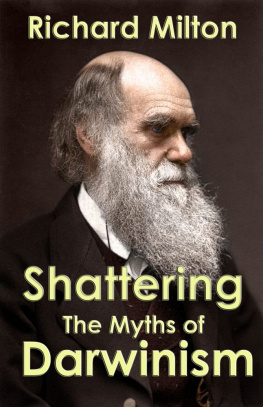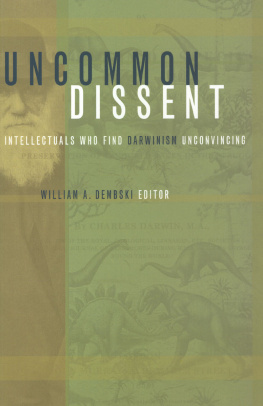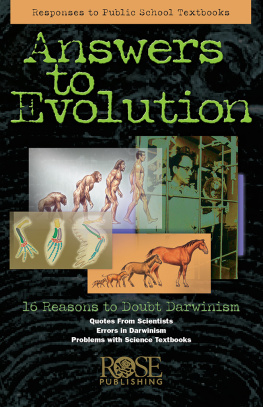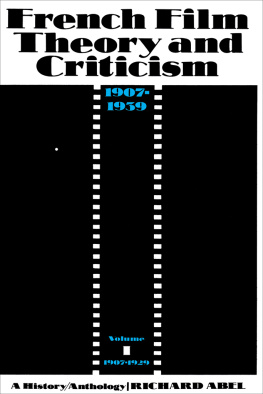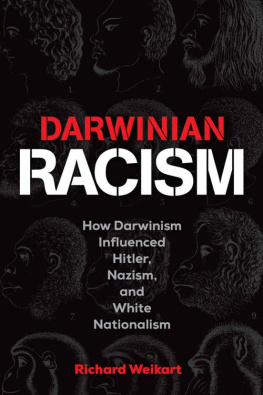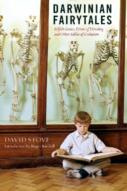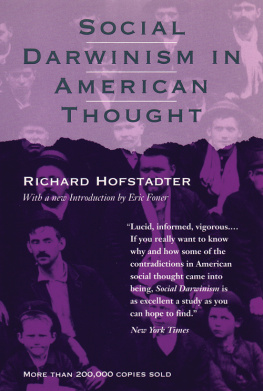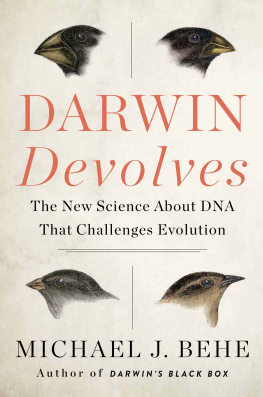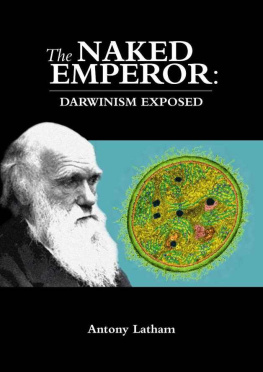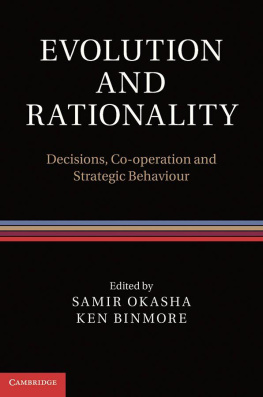Richard Milton - Shattering the Myths of Darwinism: a rational criticism of evolution theory
Here you can read online Richard Milton - Shattering the Myths of Darwinism: a rational criticism of evolution theory full text of the book (entire story) in english for free. Download pdf and epub, get meaning, cover and reviews about this ebook. year: 2000, genre: Romance novel. Description of the work, (preface) as well as reviews are available. Best literature library LitArk.com created for fans of good reading and offers a wide selection of genres:
Romance novel
Science fiction
Adventure
Detective
Science
History
Home and family
Prose
Art
Politics
Computer
Non-fiction
Religion
Business
Children
Humor
Choose a favorite category and find really read worthwhile books. Enjoy immersion in the world of imagination, feel the emotions of the characters or learn something new for yourself, make an fascinating discovery.
- Book:Shattering the Myths of Darwinism: a rational criticism of evolution theory
- Author:
- Genre:
- Year:2000
- Rating:3 / 5
- Favourites:Add to favourites
- Your mark:
- 60
- 1
- 2
- 3
- 4
- 5
Shattering the Myths of Darwinism: a rational criticism of evolution theory: summary, description and annotation
We offer to read an annotation, description, summary or preface (depends on what the author of the book "Shattering the Myths of Darwinism: a rational criticism of evolution theory" wrote himself). If you haven't found the necessary information about the book — write in the comments, we will try to find it.
Richard Milton: author's other books
Who wrote Shattering the Myths of Darwinism: a rational criticism of evolution theory? Find out the surname, the name of the author of the book and a list of all author's works by series.
Shattering the Myths of Darwinism: a rational criticism of evolution theory — read online for free the complete book (whole text) full work
Below is the text of the book, divided by pages. System saving the place of the last page read, allows you to conveniently read the book "Shattering the Myths of Darwinism: a rational criticism of evolution theory" online for free, without having to search again every time where you left off. Put a bookmark, and you can go to the page where you finished reading at any time.
Font size:
Interval:
Bookmark:
Shattering the Myths of Darwinism
Richard Milton
What the Press said about Shattering the Myths of Darwinism
"The world of science faces the biggest challenge yet to one of its most basic beliefs: Charles Darwin's theory of evolution. An authoritative compilation of scientific findings."
Neville Hodgkinson, The Sunday Times
Richard Milton's book... could shake the religion of evolution as much as Honest to God shook popular Christianity 30 years ago."
Leader Column, The Times
"Milton... utters some important warnings. We ignore them at our peril."
Julia Neuberger, The Sunday Times
"In his popular book, journalist Richard Milton shows Darwinism as a crumbling edifice, supported only by a conservative scientific establishment."
Matthew Cockerill, The Daily Telegraph
Contents
Preface
Part One: Chaos
Part Two: Clay
Part Three: Chance
Part Four: Creation
Afterword: Controversies
Preface
When the first edition of this book was published, it was greeted with a storm of controversy no less fervent than the debate that met the publication of Darwin's theory of evolution one hundred and fifty years ago.
On one hand, according to a leading article in The Times ; 'Richard Milton's Shattering the Myths of Darwinism ... could shake the 'religion' of evolution as much as Honest to God shook popular Christianity 30 years ago.'
While on the other, according to a review by Darwinist Richard Dawkins, the book is 'loony', 'stupid', 'drivel' and its author a 'harmless fruitcake' who, 'needs psychiatric help.'
When Shattering the Myths of Darwinism was published, I expected it to arouse controversy, because it reports on scientific research that is itself controversial and because it deals with Darwinism - always a touchy subject with the biology establishment.
I didn't expect science to welcome an inquisitive reporter, but I did expect the controversy to be conducted at a rational level, that people would rightly demand to inspect my evidence more closely and question me on the correctness of this or that fact. To my horror, I found that instead of challenging me, orthodox scientists simply set about seeing me off 'their' property.
Richard Dawkins, a reader in zoology at Oxford University, wrote his review for the New Statesman magazine 'lest the paper commission someone else who would treat it as a serious scientific treatise'.
Dawkins devoted two thirds of his review to attacking my British publishers, Fourth Estate, for their irresponsibility in daring to accept a book criticizing Darwinism and the remainder to assassinating my own character in the sort of terms quoted above.
Dawkins is employed at one of Britain's most distinguished universities and is responsible for the education of future generations of students. Yet this is not the language of a responsible scientist and teacher. It is the language of a religious fundamentalist whose faith has been profaned.
Nature magazine, probably the most highly respected scientific magazine in the world, scented blood and joined in the frenzy. Its editor, John Maddox, ran a leading article that described me as believing science to be a myth (I don't) evolution to be false (I don't) and natural selection a pack of lies (I don't).
These intemperate responses betoken more than a squabble between an inquisitive journalist and a couple of reactionary academics. They raise a number of important questions of general public interest. Who do you have to be to have a voice about scientific research on which large sums of public money are spent? Who decides who you have to be? In what forum, or by what mechanism, can the voices of dissent ever be heard in science?
It is not just outsiders who cannot be heard, it is dissenting members of the scientific professions themselves. In my mailbox are letters from biologists who are concerned at the teaching of Darwinism as holy writ and from medical men whose practice has led them to make medical discoveries having a bearing on evolutionary biology. They have sought to publicize these discoveries in journals such as Nature but have been universally rejected because their discoveries are anti-Darwinian in implication and hence counter to the ruling ideology in the life sciences. They have appealed to me - a non-scientist - to help them gain publicity.
It is worrying to learn that in countries like Britain and The United States, thought to be among the most civilized on Earth, some professional scientists can feel so isolated and ignored that they have to take their case directly to the public via the popular press. Equally, it is depressing to discover that in countries which pride themselves on their intellectual tolerance, it is impossible to voice scientific dissent without attracting this kind of response from those who perceive themselves to be the guardians of orthodoxy.
In seeking to defend the ideological citadel of Darwinism, the most vociferous critics of this book have allowed their emotions to mislead them so far as to attack me for advocating beliefs that I have never held and do not support. Both Richard Dawkins and Nature have tried to suggest that I do not believe in evolution and that I believe the Earth is merely a few thousand years old.
To forestall any repetition of false claims like these, let me make my position clear on both issues from the outset. I accept that there is persuasive circumstantial evidence for evolution, but I do not accept that there is any significant evidence that the mechanism driving that evolution is the neo-Darwinian mechanism of chance mutation coupled with natural selection. Second, I do not believe that the Earth is only a few thousand years old. I present evidence that currently accepted methods of dating are seriously flawed and are supported by Darwinists only because they provide the billions of years required by Darwinist theories. Because radioactive dating methods are scientifically unreliable, it is at present impossible to say with any confidence how old the Earth is.
Part One
Chaos
Chapter 1
A National Treasure
By the river Thames at Teddington, west of London, straggles a cluster of nondescript factory buildings that seem an unlikely home for a national treasure. Yet the buildings are of national importance to everyone in the United Kingdom because of a few pieces of metal kept there.
The buildings are those of the National Physical Laboratory, and the pieces of metal are platinum standards kept at strictly regulated temperature in air-conditioned chambers to act as the indisputable authority for Britain's national weights and measures, the pound and the kilogram, the yard and the meter.
Paradoxically, these standards are never used for everyday purposes. No-one goes to Teddington to measure out a meter of cloth or a foot of parcel string. But their mere existence - unchanging and unchallengeable - is the nation's guarantee that standards exist: that should it ever be necessary, it is theoretically possible to make a physical comparison with the accepted measure and say with absolute certainty that the subject under test either is or is not of the stated weight or length.
It's not easy for members of the public to visit the National Physical Laboratory, because it is a busy government research establishment and the repository of many secrets. But it is certainly possible. Those fortunate enough to be given access to the NPL will see the famous platinum kilogram standard and the atomic clock that is the authority for Greenwich Mean Time. You can check your wristwatch and, in principle at least, check up on your 12-inch ruler and the weights of your kitchen scales.
A few miles to the east of Teddington stands the very much more imposing structure of the British Museum of Natural History, famous to generations of schoolchildren for its dinosaurs and dramatic reconstructions of the Earth's geological history. This building, too, is the repository of a 'national standard' but one that is not on display in a glass case and that has proved very much more difficult to track down. The museum is one of the world's primary sources or authorities for the theory of evolution by natural selection, the theory that is taught in schools and universities the world over: a kind of headquarters for Darwinism.
Next pageFont size:
Interval:
Bookmark:
Similar books «Shattering the Myths of Darwinism: a rational criticism of evolution theory»
Look at similar books to Shattering the Myths of Darwinism: a rational criticism of evolution theory. We have selected literature similar in name and meaning in the hope of providing readers with more options to find new, interesting, not yet read works.
Discussion, reviews of the book Shattering the Myths of Darwinism: a rational criticism of evolution theory and just readers' own opinions. Leave your comments, write what you think about the work, its meaning or the main characters. Specify what exactly you liked and what you didn't like, and why you think so.

